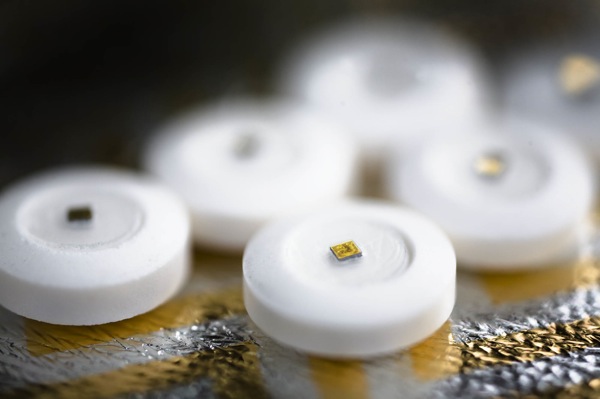The FDA has given new meaning to the term inside scoop, with the approval of an ingestible medical sensor earlier this month from Proteus Biomedical. While the tool’s medication-tracking capability conjures up a Big Brother approach to treatment adherence, Proteus’ co-founder George Savage insists it’s not going to punish patients for missing a dose. Or two. Or eight.
“The rationale for doing this is not to scold patients for being imperfect,” Savage told MM&M. “Not one of us is perfect, that’s the point.”
The sensor, which the company describes as about the size of a grain of sand, can be buried within a pill. Upon ingestion, it sends signals to a petite, water-resistant patch worn by the patient. Once the patch receives its signal, information is wirelessly uploaded to anything Internet, including mobile phones, laptops and tablets. A password keeps the information private, and interested parties can log in and see how a patient’s actual daily medication habits match up with the prescribed ones.
With a hard copy of the compliance record in hand, a clinician or caregiver can see just how a patient may be sticking with a regimen. Savage said this information could provide a critical talking point for doctors, which is, “Why haven’t you been taking your medications?” If the answer is an unlivable dosing schedule, the solution could be as easy as changing the dose so it is livable.
The information, which the firm describes as a digital health feedback system, provides a valuable opportunity for follow-through. It could turn out that the right medication has been prescribed but is ineffective because of inconsistent use. Or, if a new dose shows a higher adherence rate, but a patient still feels poorly or isn’t improving, the data could signal a problem with medication choice.
The feedback, added Savage, is “primarily for patients and the people in the patient’s social network, usually family members who are helping them deal with complicated illnesses.” From a personal perspective, Savage said the Proteus system would be a way for him to see how he could help his mother, who lives too far away for a drive-by visit, and says the current lack of daily insight means, “I have no data, no tools, no help…I have to be there in person.”
The company is not yet targeting specific illnesses, but the system could be invaluable for patients with complex dosing regimens, as well as those with conditions for which poor adherence is common, such as bipolar depression, schizophrenia and Alzheimer’s disease. In such instances, he said, caregivers could log into the health records and call patients to tell them they need to take a pill.
The first launch of the sensor/patch combination is slated for September, when Proteus introduces the system in the UK, where it was approved in 2010. The company has approval there for a two-pill approach — a blister pack in which one pill is the medication itself and the other pill contains the sensor. (Savage said that some clients, including Novartis and Otsuka, are looking into the feasibility of one-pill approaches to embedding the sensor within their medications.)
The pill combinations will be offered through the UK-based Lloyd’s pharmacy chain and will focus on patients who are taking multiple medications, as opposed to treating a particular condition. Savage said this will mean the majority of the patients will probably be elderly who are living alone, or at least independently, as opposed to in a group medical setting.
Savage said he is not sure when the technology will roll out in the US, and was not able to put a price on how much the sensor system could tack onto a prescription. He did, say, however, that it will be offered on an opt-in basis, so that patients can request to have medications with or without sensors, and can bypass what he expects will be a monthly fee for the tracking service.
He doesn’t envision third-party payers picking up the tab but hopes that the added insight could be enough to convince patients and their care networks to adopt it. “This is a tool of individual empowerment.”








